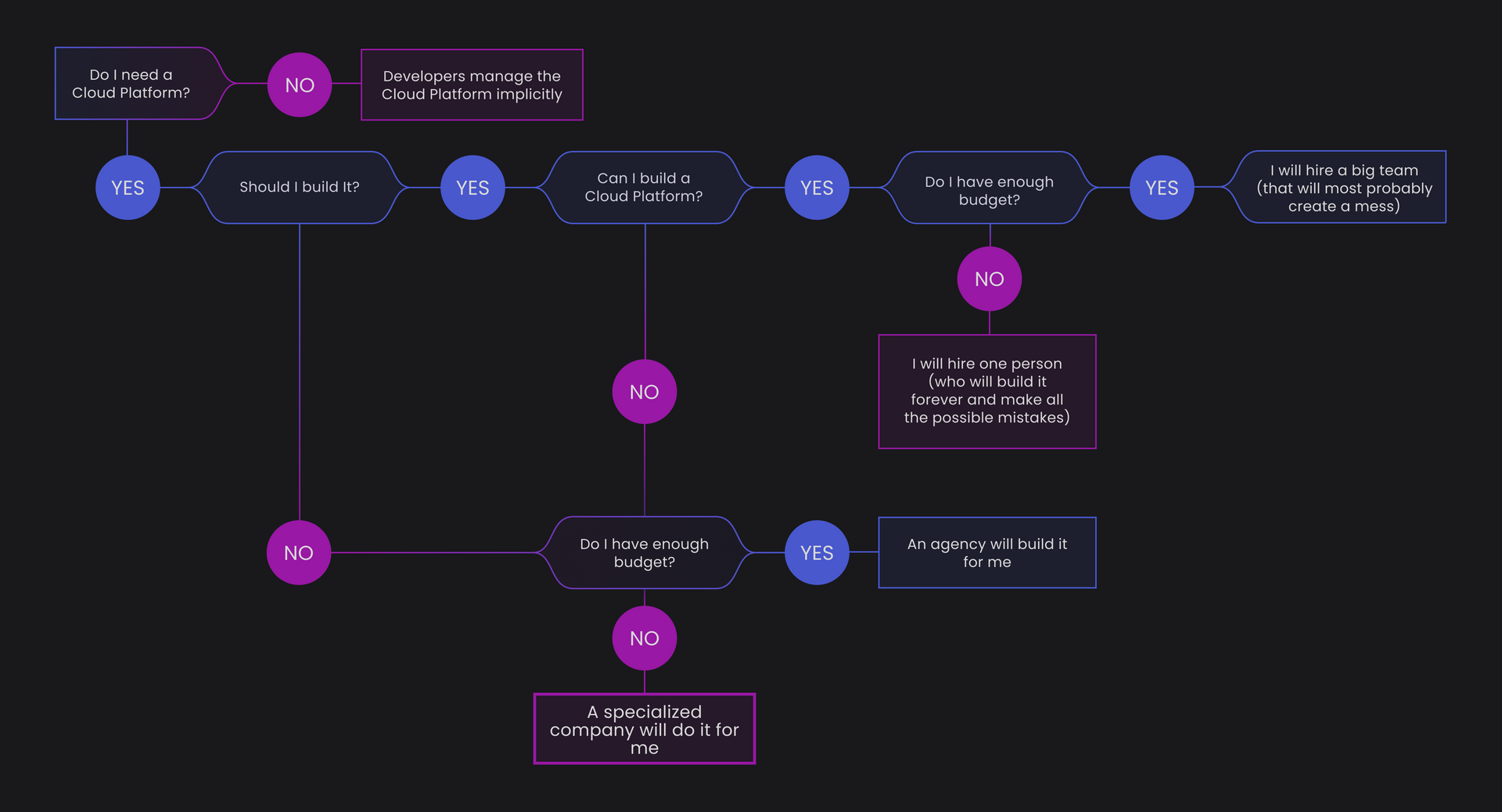2 Key Mistakes in Cloud Infrastructure Management: Are You Guilty?
Technical teams make many mistakes when dealing with cloud infrastructure management, but some significantly affect businesses. And these are not technical errors;
In this article, we are going to explore two critical mistakes C-level executives make about cloud infrastructure management;
- Overstaffing
- Assigning infrastructure management to developers
Let's start with the fact that you can always entrust your cloud infrastructure management to professional external teams and avoid these two mistakes, but if you haven't done it yet, then
- You haven't calculated how much it will cost to entrust infrastructure developers in the long run.
- You've had a lousy experience collaborating with external teams.
- You don't see how inefficient building a large infrastructure team is.
- You think your product infrastructure is too complex and can only trust it to the internal team.
- You undervalue the importance of creating solid infrastructures.

What's the problem of a big team if you can afford one?
During rapid expansion or technological transition phases, the need for diverse specialized skills leads to hiring more staff than is necessary.
Many businesses can afford to hire cloud architects and DevOps engineers, resulting in a large team. They hope that this team will solve all the issues with their cloud infrastructures.
In reality, it is the contrary. There are many problems with big infrastructure management teams.
As many experts as many opinions
When you hire many professionals, you should expect them to work with their own experience and tools, and each professional's toolkit and approach are often different from the next.
The diversity of expertise can lead to expanding tools and platforms within the team and complicating the cloud infrastructure rather than optimizing it, as different specialists might advocate for the solutions, tech stack, and approaches they are most familiar with.
Besides, it may lead to conflicts and misunderstandings between team members and affect the business processes.
Higher costs, lower results
Building a big team of infrastructure management experts sounds so ambitious and sexy. The fun part is that the more good experts you have, the lower results you may get. Why?
Naturally, hiring many experts will increase the company's operational costs, but there won't be equivalent results because the diverse expertise will slow down the decision-making process.
So, you will spend tons of money on a big team and get almost the same or sometimes even lower results.
Many goalkeepers, one goal!
Imagine your soccer team has five goalkeepers, but only one can play in goal at a time. All these goalkeepers are good at stopping goals, but if only one can play, the others have to sit on the bench and watch. They might feel unhappy because they can't use their skills to help the team.
When people don't get to use their skills, they might not be as happy or work as hard, which can cause the team to perform less well.
So, you may financially afford a big team, but can you bear it?
The Dangers of thinking that "Our Developers will Manage the Infrastructure."
Several challenges arise when management decides against forming a dedicated professional team for infrastructure management, believing their developers can handle these responsibilities alongside their primary development tasks.
"Wearing multiple hats" has both short-term benefits and long-term drawbacks.
The Skill Gap
While many developers have a broad skill set, infrastructure management requires specific skills in security, networking, monitoring, etc. Developers can learn how to deal with infrastructure issues, but it will take much time and effort and cost a business a fortune.
Errors & oversights
Given the complexity of modern infrastructure, especially in cloud environments, the risk of mistakes increases when developers manage it. Juggling too much between code and infra can lead to oversights and errors, as their focus is divided. This can lead to security vulnerabilities, system downtime, and data breaches, potentially severe consequences for the organization.
Slowed Development Cycles and Less Innovation
Development cycles slow down as developers are busy with infrastructure tasks and lose focus on their primary job. New features are always delayed. Concerning new solutions, Innovation often comes from having the time to think creatively about solving problems. If developers are preoccupied with infrastructure, they might need more mental space or time to develop innovative solutions.
No Proactiveness
When developers are responsible for the infrastructure, they cannot proactively follow monitoring or continuous development because it is not their primary job. As they say, each person should do their own thing.
In addition to the above problems, programmers will get tired very quickly and easily when there are so many tasks, reducing their motivation, efficiency, and productivity.
Beyond DIY: The Values of Expert Cloud Management Teams
Entrusting infrastructure management to a professional team is an optimal approach, offering several benefits due to their extensive experience and expertise:
- Their involvement in numerous projects has enabled them to cultivate best practices for addressing challenges.
- They are familiar with potential emerging issues and have pre-established strategies for resolving such difficulties.
- Through standardization, they streamline processes that may initially appear complex.
- Their exposure to various industries allows them to solve multiple challenges.
At Das Meta, we bring enterprise-level expertise to growing teams and offer them professional and affordable infrastructure management through ready-made components and blueprints. We let our partners grow businesses without infrastructure management headaches. Don't feel guilty anymore, let’s talk.
Open Source is a Philosophy
We understand that by collaborating with others in the community, we can create better technologies that have a positive impact on society.

Contact us
contracts@dasmeta.com
+49 30 16637857
Rheinsberger Str. 76/77 10115 Berlin Germany






